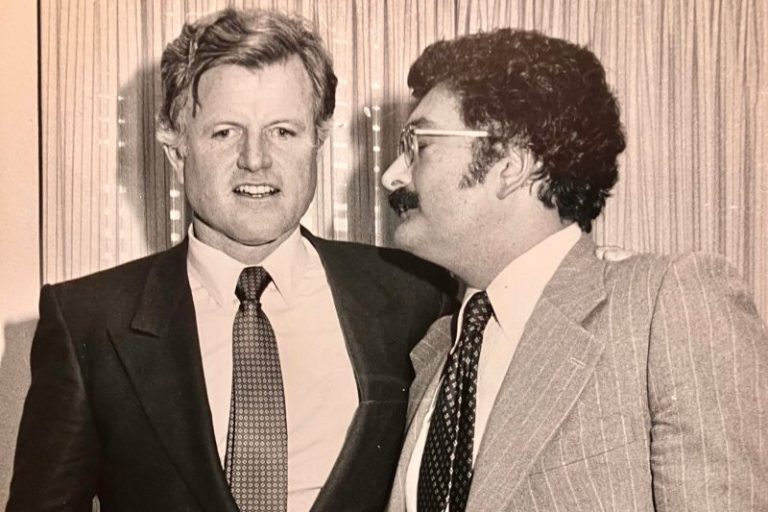Morris J. Amitay, a lobbyist who spent decades rallying financial, military and moral support from the U.S. government for the state of Israel and helped transform the American Israel Public Affairs Committee into one of the most effective advocacy organizations in Washington, died Feb. 10 at his home in Rockville, Md. He was 86.
The cause was metastatic prostate cancer, said his son Stephen Amitay.
Mr. Amitay became executive director of AIPAC in 1974, succeeding Isaiah L. Kenen, who had founded the organization in the early 1950s.
Under Mr. Amitay’s six-year leadership, AIPAC undertook an expansion that would ultimately make it the most influential member of a constellation of groups lobbying the U.S. government on behalf of Jewish and Israeli causes.
In a 2006 profile of Mr. Amitay published in The Washington Post, a reporter wrote that “even among his peers his success is something of a legend.’
He was deeply connected on Capitol Hill, with sources in Senate and congressional offices who kept him apprised on legislative matters of concern to Israel. He was in close touch with the Israeli ambassador to the United States. And he astutely marshaled AIPAC’s resources to promote legislators who supported Israeli causes and challenge those who did not.
Led by Mr. Amitay and his successor, Tom Dine, “AIPAC was transformed from an intimate, low-budget operation into a large, mass-based organization,” professors John J. Mearsheimer and Stephen M. Walt wrote in the 2007 book “The Israel Lobby and U.S. Foreign Policy.”
When Mr. Amitay took office, AIPAC had a staff of about a dozen and an annual budget between $300,000 and $400,000. He was credited with tripling both those figures. Three decades later, according to Mearsheimer and Walt, AIPAC’s annual budget was between $40 million and $60 million.
AIPAC and other groups advocating for Israeli interests have been buffeted by criticism over the years that they turn a blind eye — and ask the U.S. government to do the same — to the plight of Palestinians in their seemingly intractable conflict with Israel.
Mearsheimer and Walt took a critical view of what is often described as the “special relationship” between the United States and Israel, arguing that pressure from AIPAC and other pro-Israel groups had distorted U.S. policy, so that it was no longer entirely in U.S. interests.
Defenders of AIPAC charged that antisemitism, latent or otherwise, lay at the root of much criticism directed at Israel and its supporters. In 1977, a bomb tore through Mr. Amitay’s Rockville home one morning at 3:20 a.m., leaving a hole 10 feet in diameter and killing his dog. He and his family were unharmed. An investigation yielded no charges.
Mr. Amitay left AIPAC in 1980 to work privately as a lobbyist, with clients including the American Petroleum Institute, BAE Systems and Northrop Grumman. He continued advocating for Israel through the Washington Political Action Committee, which he ran for four decades.
Mr. Amitay — he used the middle initial J, but his family did not believe it stood for anything — was born in Manhattan on July 5, 1936. His father, who was born in Palestine under Ottoman rule, ran an Army-Navy store, and his mother, a Ukrainian immigrant, was a homemaker.
After studying at the Ramaz school, a yeshiva in New York, Mr. Amitay received a bachelor’s degree in government from Columbia University in 1958. He then enrolled at Harvard University, where he received a law degree in 1961 and a master of public administration degree the following year. His seminar professor, according to his family, was future secretary of state and national security adviser Henry Kissinger.
Mr. Amitay spent the early years of his career in the Foreign Service, with international postings in Italy and South Africa. He later worked on Capitol Hill in the offices of U.S. Rep. Robert Kastenmeier (D-Wis.) and U.S. Sen. Abraham Ribicoff (D-Conn.) before joining AIPAC.
His marriages to Sybil Levson and Martha Kaufman ended in divorce.
Survivors include three children from his first marriage, Michael Amitay of Silver Spring, Md., Cheryl Amitay of Bowie, Md., and Stephen Amitay of Bethesda, Md.; a daughter from his second marriage, Rae Amitay of Chicago; and five grandchildren.
Mr. Amitay once joked to the New York Times that “with all the opprobrium that has been heaped on lobbyists,” he had taken to describing himself instead as a “corridorist.” But by whatever name, he remained committed to the substance of his work.
“The name of the game, if you want to help Israel,” he said, “is political action.”

